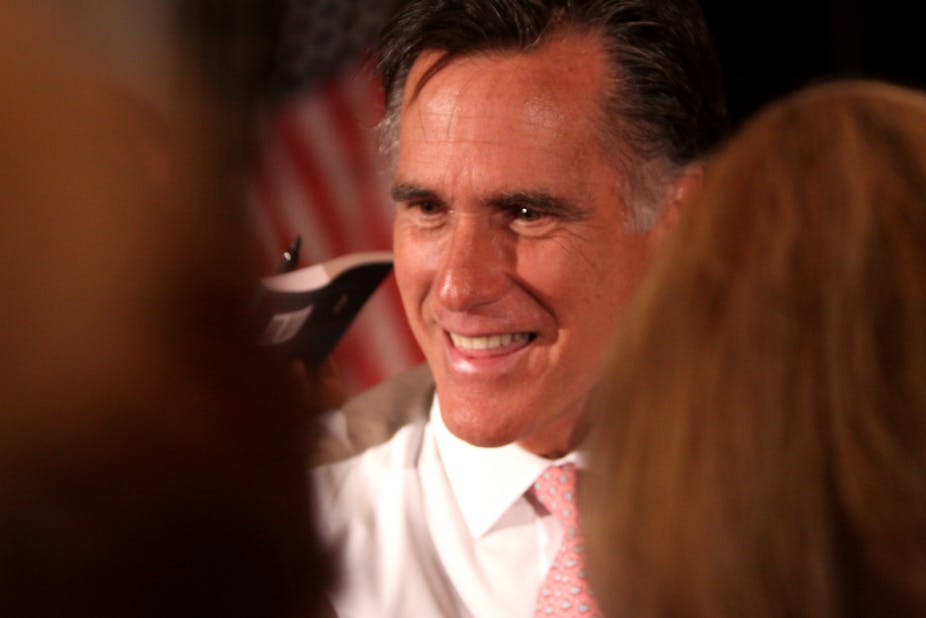Mitt, a newly released documentary about former presidential candidate Mitt Romney, provides an up-close look at the exhausting presidential election process in the U.S. This is no House of Cards when it comes to entertainment; rather, it’s more of a quirky home movie documenting some of the joy and pain of two failed presidential efforts by a man who wanted to fulfil his father’s dream, and earnestly serve his country.
There are countless scenes of the clean-cut Romney with his charming and equally clean-cut, handsome, and well-bred clan, chatting amicably about what he should decide, how he should deal with opportunities and adversity, and whether what he is doing is really worth it. Romney comes across here as a loving family man, a devout Mormon – and unfortunately for him, an insufficiently creative or empathic politician.
Romney ran and failed to win the Republican nomination for president in 2008. His father, George, a talented automobile executive and popular three-term governor of Michigan, ran and lost his own bid to be the Republican nominee for president in 1968. Mitt had also run unsuccessfully for the senate in 1994 (as had his mother in 1970), but he was elected governor of Massachusetts in 2002, and finally win the Republican nomination for president in 2012.
On 7 November 2012, he won almost 48% of the popular vote to Obama’s 50.6%. Americans were obviously divided. (Note that Obama’s public approval these days hovers around 43% on a good day.) President Obama won 62.2 million popular votes and 332 electoral college votes to Romney’s 59.1 million and 206. In practical political logistics, Romney lost because he failed to win several swing states such as Ohio, Florida, Iowa, Michigan, Virginia, Wisconsin, and Colorado.
Romney had a chance to pick off these battleground states. Why did he lose? There is no single easy explanation. The American economy was slowly but surely rebounding from its huge recession. While Obama did not have to endure the crazy patchwork of pre-election caucuses and primaries that Romney did, and the republican was hammered and emerged a wounded candidate. Americans wanted the wars in Iraq and Afghanistan to end, and Obama appeared to be doing this. On top of these factors, Obama benefited from a shifting demographic landscape that looks likely to favour Democrats for some time.
But another reason Romney lost – and here is where Greg Whitley’s documentary is revealing – was his personal style. Romney’s campaign persona was mechanical and seldom inspirational. It was clear that he was an enormously wealthy businessman and a devout family man, but this was not enough.
Above all, though, Mitt is a document of how painful and sometimes petty American politics can be. The Romney it depicts can’t understand why rival Republican campaign managers hate him. He agonises about how negative campaign ads smeared him as a “flip-flopping Mormon”. He and his sons wonder aloud about the near impossibility of correcting what they believe is unfair branding. They fully appreciate how first impressions, especially negative images, can be hard to reverse.
Romney’s main message in the 2012 campaign was that America needed to lessen the tax burden on corporations and small businesses. He called for less regulation and less government. He ran as a neo-conservative on foreign policy, pledging not to cut military spending. He promised to end Obamacare, which was actually modelled on the Massachusetts system that he enacted as governor. He espoused socially conservative positions on immigration, marriage equality and abortion. Some of these positions were contrary to majority sentiment in the US but were fixed Republican dogma from which he could not waver.
Romney was unabashedly proud of being a successful capitalist, but sometimes came across as dismissive of those without business experience. His opponents, in both parties, portrayed him as so rich that he could not understand the average person. (It didn’t help that he was reluctant to release tax returns.) His strength was his ability to celebrate freedom and free enterprise, but many of his other policy initiatives seemed recycled and even cold-hearted.
Candidate Romney was attractive and persistent, but unlike Ronald Reagan, Bill Clinton, or Barack Obama, he could not fire up a crowd. He gained a reputation for being formal and stiff.
This documentary – with wonderful footage from both the 2008 and the 2012 campaigns – reveals a more likable and sometimes even light-hearted and playful Mitt Romney than was ever seen in public. It also captures his understandable unease with (and sometimes disdain for) the strange and often demeaning presidential election process.
Mitt is a film for political junkies. It is unlikely to be a major hit or prizewinner. But its intimate, unrehearsed insider access to a patriotic and earnest national politician, one who struggles to find his way up the proverbial “greasy pole” of politics, makes for a poignant and winning film. It is undeniably a friendly bouquet presented in honour of Governor Romney, but it also leaves the viewer questioning the lengthy, convoluted and unseemly process by which Americans select their presidents.

